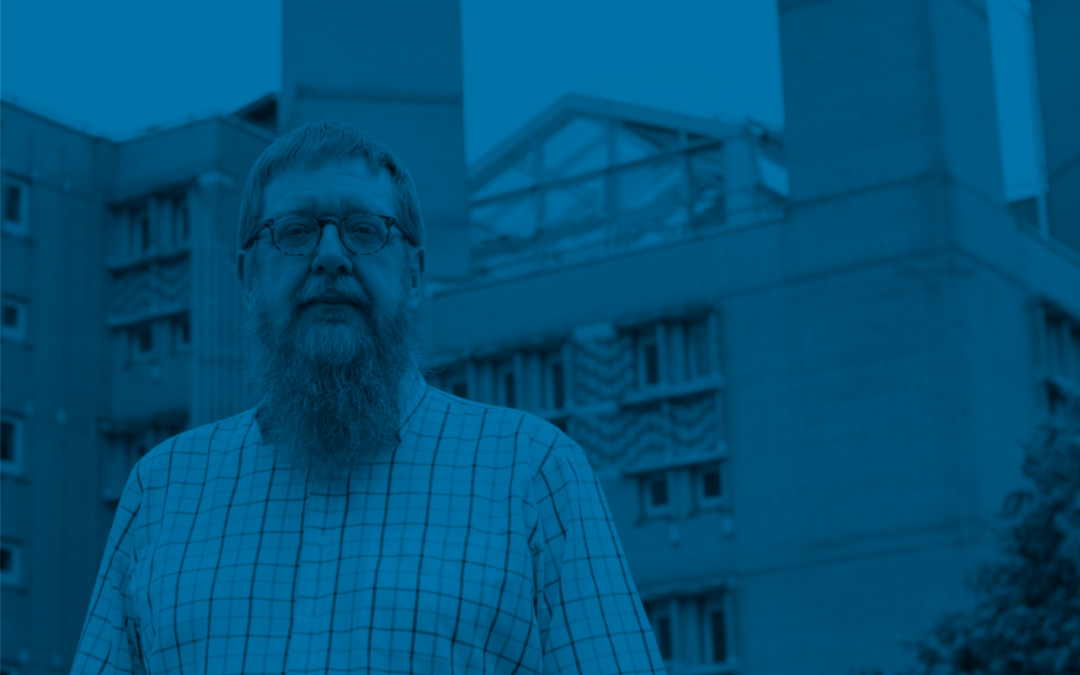We asked Andy Mabbett, our new Wikimedian in Residence, to interview himself.
The self-interview was originally published on the CU Wikimedian in Residence blog: www.wikimedian.coventry.domains
Hello, who are you?
Hello, thanks for asking. I’m you. Or us. Er, that is, I’m Andy
Mabbett, from Birmingham, a graduate in Computer Studies at Sheffield
City Polytechnic (which tells you I’m no spring chicken; it’s been
called Hallam University for some time now), a former local government
web manager, and, since 2003, an avid contributor to Wikipedia. I’m also
the Wikimedian in Residence at Coventry University.
The what?
Wikimedian in Residence.
What’s one of those?
It’s like a Wikipedian in Residence, but with an “m”
Very funny. What does it mean?
My role is act as a two way ambassador, between the Wikimedia Community and the University.
You’re not making this easy. The what community?
Sorry, I thought you of all people knew this stuff. Wikimedia. That’s the umbrella name for the movement that runs the Wikipedias, as well as their sister projects: Wikimedia Commons, Wikidata, Wikisource, Wiktionary, and others.
I never knew there was so much in it. Hang on, you said, Wikipedias, plural?
Indeed. There’s the biggest, in English, but also Wikipedias in French, German, Italian, Spanish, Catalan, Polish, Russian, Arabic, Mandarin, Japanese, Punjabi…
It’s OK, you don’t have to list them all!
…Gaelic, Welsh and Cornish. Almost three hundred in all. Oh, and one in “Simple English”, for children, learners of English and people with reading disabilities.
Yes, but what do you actually do?
The primary focus of my work will be to encourage and assist teaching staff to make use of Wikipedia, and its sister projects, as a tool for active learning, teaching and assessment, while at the same time ensuring that any changes made to those projects are beneficial to them and done within their standards.
Assessment?
That’s right. A student might, say, be asked to improve, or write from scratch, a Wikipedia article instead of writing an essay. That way, when they’ve finished, the work is there for the benefit of everyone else. Experience elsewhere shows that this is something students really enjoy, and find worthwhile.
Anything else?
Yes, lots. For example, I’ll help to ensure that the university’s
work is reflected in Wikicite, which is an initiative within Wikidata,
that is collating metadata on citable works, such as the books and
papers written by our researchers and alumni.
Is that it?
No. I’ll try to encourage everyone to contribute to the Wikimedia
projects, even if in small ways, like fixing typos, adding citations or
donating the occasional photographs, in their own time. I’ll also be
working across the university to see how we can further open up access
to its work and collections, in order to contribute to the Wikimedia
vision of “a world in which every single person on the planet is given
free access to the sum of all human knowledge, in their own language”.
Sounds like you might have done this before?
Oh yes. I’ve taught Wikipedia on courses at Birmingham University and
the Polytechnico di Milano, and to PhD candidates from a consortium of
EU universities, as well as running extracurricular events at
universities all over the UK, and giving guest lectures at universities,
libraries and museums on five continents. And I got an ESA astronaut to
make the first ever content produced specifically for Wikipedia, not on planet Earth.
I’m impressed.
I, er, I mean you, should be. I’ve also been Wikimedian in
Residence with the Royal Society of Chemistry, the Physiological
Society, the History of Modern Biomedicine Research Group at Queen Mary
University London (try saying that quickly!), TED talks, and at a number
of museums and galleries. And with ORCID (that one is ongoing).
You deserve a prize for that.
I have some—an “honourable mention” in the Wikimedia UK ‘Wikimedian of the Year’ awards in 2014; a Fellowship of the Royal Society for the Encouragement of Arts, Manufactures and Commerce, and “Hisseden İnsan”, awarded by Üsküdar University in Istanbul.
Cool. Where can I learn more?
To start with, you can follow this blog. And the project page on Wikipedia. Or drop me an email or leave a comment below if you’d like to take part, or have an idea or question about Wikimedia projects.

